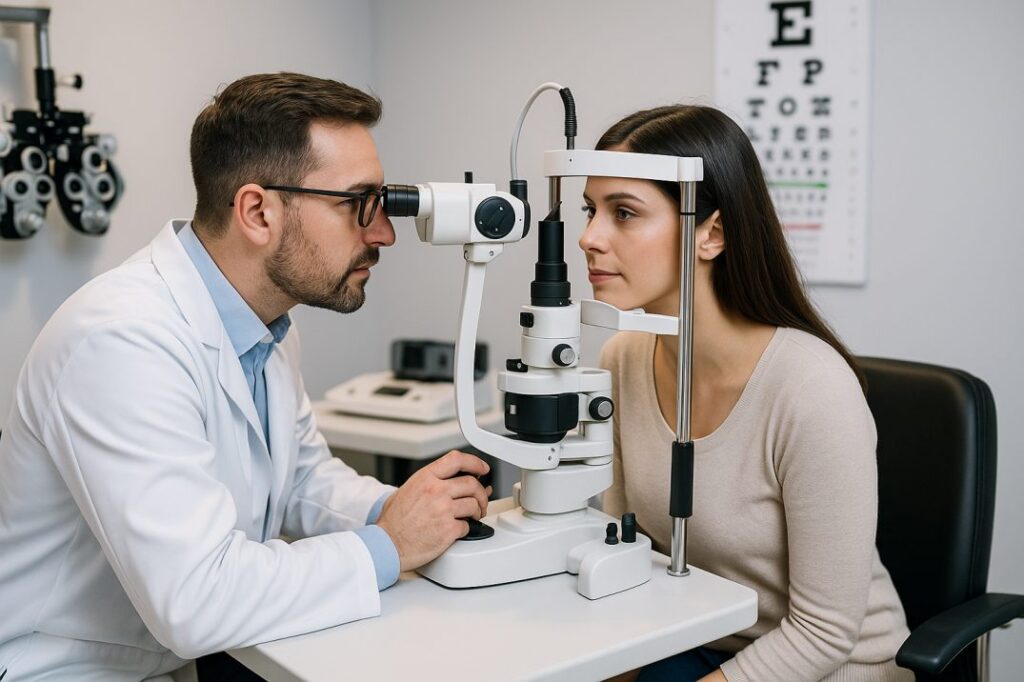What to Expect in a 2025 Eye Exam | Seattle Guide
Key Takeaways
-
Annual exams are essential—even without symptoms: Many serious eye and health conditions are detected during routine checkups before noticeable issues arise.
-
Eye health reflects overall health: Your eyes can reveal early signs of diabetes, hypertension, and neurological disorders, especially for screen-heavy lifestyles in Seattle.
-
High-risk individuals need closer monitoring: If you have diabetes, a family history of eye disease, or are 65+, yearly exams are non-negotiable.
-
Come prepared for the best results: Bring your eyewear, health history, insurance info, and a list of any symptoms or medications.
-
Advanced tech at Cannon EyeCare enhances detection: From 3D OCT scans to digital retina imaging, your exam includes cutting-edge diagnostics.
-
Aftercare matters: Plan for dilation recovery—bring sunglasses and avoid driving or prolonged screen use for a few hours post-exam.
-
You leave with a clear plan: Whether it’s a new prescription, a treatment strategy, or a specialist referral, Cannon EyeCare ensures you’re informed and supported.
What to Expect During a Routine Eye Exam: Your 2025 Guide for Seattle
Routine eye exams are vital for lifelong vision and overall wellness, but many Seattle residents feel unsure about the process. With over ten years of serving our Seattle, WA community, Cannon EyeCare has guided thousands through their eye exams—from first-time visits to regular checkups. This easy-to-follow guide explains each step of your exam, answers common questions, and shares practical tips for a seamless experience at our Seattle clinic.
Why Routine Eye Exams Matter for Seattle Patients
Early detection preserves vision and overall health.
Comprehensive eye exams at Cannon EyeCare identify silent threats like glaucoma, cataracts, and diabetic retinopathy—often before symptoms arise. Research shows that over 50% of patients with no vision complaints had significant eye or health changes found during routine exams. Your annual visit safeguards more than your sight: it protects your independence and quality of life.
Eye Exams: A Window to Your Overall Health
Your Seattle eye doctor can detect early signs of diabetes, hypertension, high cholesterol, and neurological disorders through your eyes. For Seattle professionals facing high screen time, digital eye strain and chronic dry eye are growing concerns. Routine eye exams at Cannon EyeCare help manage these conditions and protect your long-term wellness.
Optimal Eye Exam Frequency for Seattle Residents
Cannon EyeCare follows the latest 2025 clinical guidelines for eye exam frequency:
-
Children (6–17): Every 1–2 years
-
Adults (18–64): Annually, regardless of symptoms
-
Seniors (65+): Annual comprehensive exams
-
High-risk groups (diabetes, family history of eye disease, or certain ethnic backgrounds): Annual visits or as advised by your Seattle eye doctor
Preparing for Your Visit to Cannon EyeCare in Seattle
Maximize your exam efficiency with this checklist:
-
Current glasses or contact lenses
-
Complete medication and allergy list
-
Family eye health history (glaucoma, macular degeneration, etc.)
-
Insurance card and photo ID
-
Sunglasses for post-dilation sensitivity
-
Notes on vision changes, symptoms, or questions
Your Routine Eye Exam at Cannon EyeCare: A Step-by-Step Guide
1. Personalized Health Review
Your Seattle optometrist discusses:
-
Current health conditions and medications
-
Family eye disease history (glaucoma, macular degeneration)
-
Vision concerns or symptoms
2. Preliminary Vision Testing
-
Visual Acuity: Reading charts to measure clarity
-
Ocular Motility: Assessing Eye Coordination
-
Pupil Response: Light reaction checks
-
Peripheral Vision Screening: Early detection for glaucoma or neurological disorders
3. Precision Prescription Assessment
Determines your exact glasses/contacts prescription using lens comparisons (“Which is clearer, 1 or 2?”).
4. Comprehensive Eye Health Evaluation
-
Slit Lamp Exam: Microscopic inspection for cataracts, corneal damage, or infections
-
Tonometry: Quick, non-invasive pressure test for glaucoma
-
Retinal Examination: Dilation-assisted assessment for diabetes, hypertension, or retinal disease (sensitivity precautions provided)
5. Advanced Diagnostic Imaging
-
OCT Scans: High-resolution 3D retina imaging for early disease detection
-
Digital Retinal Photography: Baseline records for monitoring Seattle patients’ eye health
Post-Exam Care at Cannon EyeCare in Seattle
Dilation Recovery Tips
After dilation, expect temporary blurry vision and light sensitivity (typically 4–6 hours). We recommend:
-
Wearing sunglasses provided at our Seattle clinic
-
Arranging rideshare/taxi services (avoid driving)
-
Limiting screen time until the effects subside
Personalized Results Consultation
Your Seattle optometrist will:
-
Explain your prescription and eye health findings
-
Answer questions about conditions like glaucoma or diabetic retinopathy
-
Provide written summaries for your records
Tailored Next Steps
If concerns arise, we create actionable plans:
-
Customized treatment for dry eye or cataracts
-
Specialist referrals for complex conditions
-
Follow-up scheduling at Cannon EyeCare
FAQs
-
A routine eye exam includes vision tests, eye health checks, prescription updates, and screening for diseases like glaucoma and diabetes. Most exams are quick and painless.




